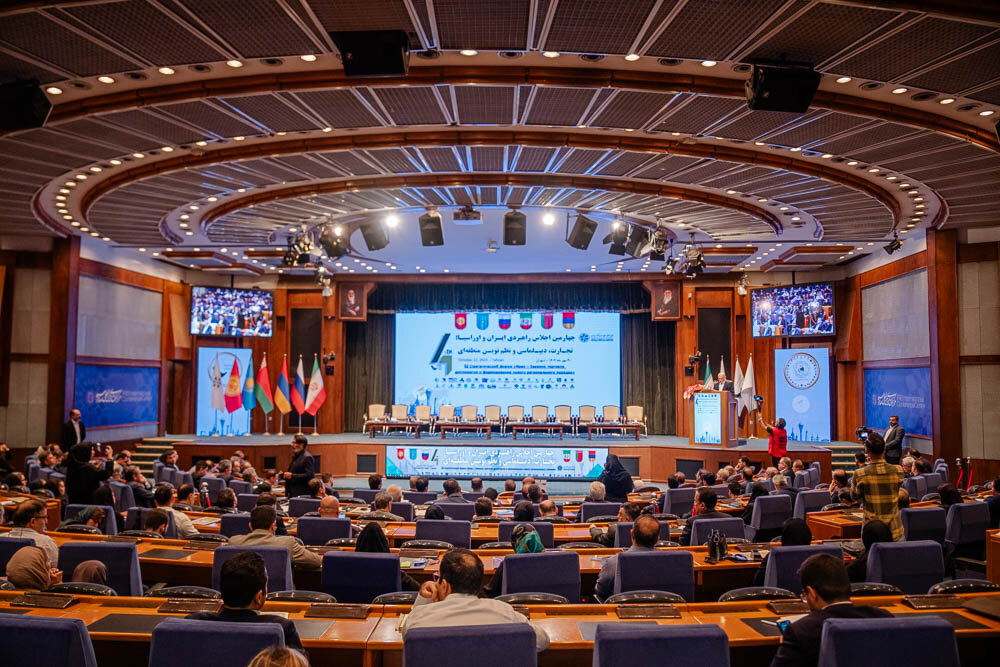‘TCCIMA ready to become national hub for Iran-Eurasia relations’

Tehran- At the fourth Iran-Eurasia Strategic Forum, Mahmoud Najafi-Arab, Head of the Tehran Chamber of Commerce, Industries, Mines and Agriculture (TCCIMA), announced the Chamber's readiness to become the national center for monitoring, evaluating, and planning Iran's interactions with the Eurasian Economic Union (EAEU).
The forum was held on Wednesday, October 22, at the IRIB International Conference Center, hosted by the capital's private sector parliament.
The event featured government officials, private sector representatives from Iran, and delegates from EAEU member states.
The agenda included three specialized panels addressing key challenges in trade development, focusing on customs and transportation, banking and finance, and standards and inspection.
A trilateral cooperation MOU was also signed between the joint chambers of commerce of Iran-Armenia, Iran-Russia, and Iran-Kazakhstan.
A strategic pivot in a multipolar world
In his address, Najafi-Arab stated that the Islamic Republic of Iran and its Eurasian partners are at a critical juncture. "On one hand, the world faces the consequences of a multipolar international system and increasing geo-economic competition, which unfortunately is still based on unilateralism and sanctions," he said. "On the other hand, countries in our region have reached a common understanding that the only path to sustainable development is relying on internal capacities, strengthening regional ties, and moving towards genuine economic integration."
He highlighted the formal implementation of the Free Trade Agreement (FTA) between Iran and the EAEU, starting in April 2024, as a milestone in the country's economic diplomacy.
Najafi-Arab described the EAEU, with a population of nearly 200 million and a GDP exceeding $2 trillion, as a strategic bridge connecting the Persian Gulf, the Caspian Sea, Central Asia, and Eastern Europe. He emphasized that success hinges on national synergy and the active participation of provincial chambers and trade associations, and that the Tehran Chamber is prepared to act as a national coordinator.
Call for indigenous mechanisms amid sanctions
The chamber head further stressed that with several EAEU members, including Iran, Russia, and Belarus, under illegal unilateral sanctions, strengthening intra-regional cooperation is paramount. "Cooperation among countries enduring similar pressures can pave the way for creating indigenous and innovative mechanisms in trade, finance, and technology," he noted, adding that such mechanisms enhance not only economic resilience but also the capacity for growth under difficult conditions.
He committed the Tehran Chamber to acting as a bridge between the private sector, the government, and international institutions. Najafi-Arab outlined three pillars for Eurasia's economic future: mutual trust and respect for balanced interests, development of shared communication and financial infrastructure, and strengthened regional institutions to manage global economic challenges.
Efforts to remove non-tariff barriers
Addressing the same gathering, Mohammad Ali Dehghan Dehnavi, Deputy Minister of Industry, Mining and Trade and Head of the Trade Promotion Organization of Iran (TPO), commended the Tehran Chamber for hosting the event.
He revealed that following the implementation of the EAEU preferential trade agreement in 2019, trade between Iran and the bloc doubled within four years.
"Currently, with the signing and implementation of the Iran-Eurasia trade agreement, tariffs on 87% of mutually agreed goods have been reduced to zero," Dehghan Dehnavi said. "The tariff barriers between Iran and the EAEU have been resolved, and the next step is to remove non-tariff barriers," he added, specifically pointing to differing standardization systems. He urged the private sectors of both sides to advocate for facilitation in this area.
Common language of trade in Eurasia
Mahdi Sanai, Political Advisor to the President, for his part, described Eurasia as a region of heightened importance in the new global order, highlighting its vast energy reserves and transit capacity. He noted that Iran's membership in four key organizations—the EAEU, BRICS, the Shanghai Cooperation Organization (SCO), and the Economic Cooperation Organization (ECO)—provides significant platforms for cooperation.
Sanai revealed that nearly 90% of Iranian goods are now traded within the EAEU at zero or preferential tariffs. However, he acknowledged a "bitter reality," stating that trade volumes with EAEU countries do not match the existing potential. "It is not fitting for Iran's trade with Caucasus or Central Asian countries to be at the level of a few hundred million dollars," he said, calling for structural economic reforms and greater government support for the private sector to resolve bottlenecks.
Practicing free trade
Hervik Yarijanian, Head of the Tehran Chamber's Industry and Mining Committee, referred to the implemented FTA as a "newborn baby" with significant growth potential.
He described it as an opportunity for the private sector to "practice competitive trade," which, despite potential difficulties, would force businesses to increase quality and innovation, ultimately benefiting the people.
Private sector is eager to connect with the world
Amir Abedi, Head of the Iran-Kazakhstan Joint Chamber, reported that Iran accounts for less than half a percent of Kazakhstan's $130 billion foreign trade. He identified the main prerequisite for increasing trade with EAEU countries as "reforming the domestic trade structure." While acknowledging the Iranian private sector's high capabilities, Abedi stressed that businesses need a more favorable environment to interact with the world and create constructive engagements, including better utilization of the Caspian Sea's potential.
MA
Leave a Comment